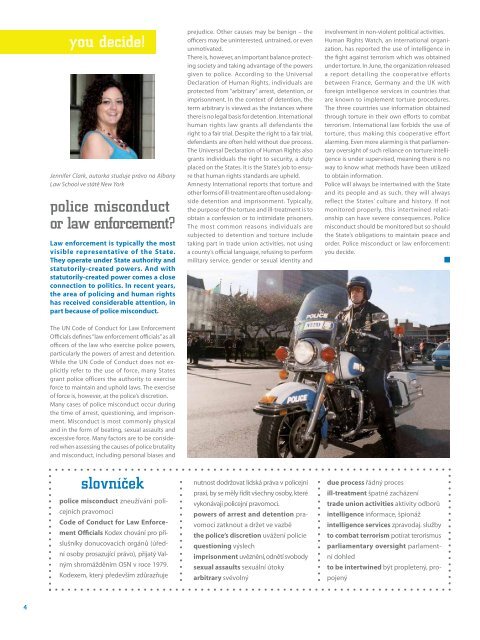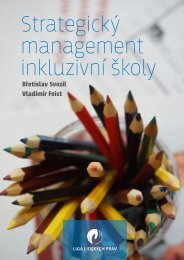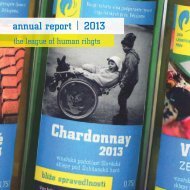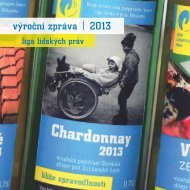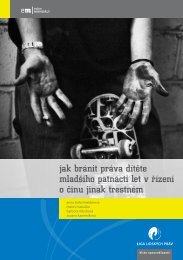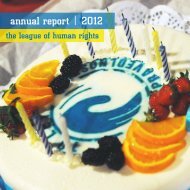EXTRA ligové noviny | číslo 2 | léto 2010 | Policie a lidská práva - jak jsme na tom dnes?
Tématem tohoto čísla je práce policie, jejíž mottem se stalo „Pomáhat a chránit“. Dočtete se, jakým problémům ve vlastních řadách policie čelí či jak po pěti letech soudů dopadla jedna z kauz policejního zásahu na CzechTeku 2005. Nechybí ani pohled z druhé strany: rozhovor s Radímem Daňkem z odboru služby pořádkové policie.
Tématem tohoto čísla je práce policie, jejíž mottem se stalo „Pomáhat a chránit“. Dočtete se, jakým problémům ve vlastních řadách policie čelí či jak po pěti letech soudů dopadla jedna z kauz policejního zásahu na CzechTeku 2005. Nechybí ani pohled z druhé strany: rozhovor s Radímem Daňkem z odboru služby pořádkové policie.
You also want an ePaper? Increase the reach of your titles
YUMPU automatically turns print PDFs into web optimized ePapers that Google loves.
4<br />
you decide!<br />
Jennifer Clark, autorka studuje právo <strong>na</strong> Albany<br />
Law School ve státě New York<br />
police misconduct<br />
or law enforcement?<br />
Law enforcement is typically the most<br />
visible representative of the State.<br />
They operate under State authority and<br />
statutorily-created powers. And with<br />
statutorily-created power comes a close<br />
connection to politics. In recent years,<br />
the area of policing and human rights<br />
has received considerable attention, in<br />
part because of police misconduct.<br />
The UN Code of Conduct for Law Enforcement<br />
Offi cials defi nes “law enforcement offi cials” as all<br />
offi cers of the law who exercise police powers,<br />
particularly the powers of arrest and detention.<br />
While the UN Code of Conduct does not explicitly<br />
refer to the use of force, many States<br />
grant police officers the authority to exercise<br />
force to maintain and uphold laws. The exercise<br />
of force is, however, at the police’s discretion.<br />
Many cases of police misconduct occur during<br />
the time of arrest, questioning, and imprisonment.<br />
Misconduct is most commonly physical<br />
and in the form of beating, sexual assaults and<br />
excessive force. Many factors are to be considered<br />
when assessing the causes of police brutality<br />
and misconduct, including perso<strong>na</strong>l biases and<br />
slovníček<br />
police misconduct zneužívání policejních<br />
pravomocí<br />
Code of Conduct for Law Enforcement<br />
Offi cials Kodex chování pro příslušníky<br />
donucovacích orgánů (úřední<br />
osoby prosazující právo), přijatý Valným<br />
shromážděním OSN v roce 1979.<br />
Kodexem, který především zdůrazňuje<br />
prejudice. Other causes may be benign – the<br />
offi cers may be uninterested, untrained, or even<br />
unmotivated.<br />
There is, however, an important balance protecting<br />
society and taking advantage of the powers<br />
given to police. According to the Universal<br />
Declaration of Human Rights, individuals are<br />
protected from “arbitrary” arrest, detention, or<br />
imprisonment. In the context of detention, the<br />
term arbitrary is viewed as the instances where<br />
there is no legal basis for detention. Inter<strong>na</strong>tio<strong>na</strong>l<br />
human rights law grants all defendants the<br />
right to a fair trial. Despite the right to a fair trial,<br />
defendants are often held without due process.<br />
The Universal Declaration of Human Rights also<br />
grants individuals the right to security, a duty<br />
placed on the States. It is the State’s job to ensure<br />
that human rights standards are upheld.<br />
Amnesty Inter<strong>na</strong>tio<strong>na</strong>l reports that torture and<br />
other forms of ill-treatment are often used alongside<br />
detention and imprisonment. Typically,<br />
the purpose of the torture and ill-treatment is to<br />
obtain a confession or to intimidate prisoners.<br />
The most common reasons individuals are<br />
subjected to detention and torture include<br />
taking part in trade union activities, not using<br />
a county’s offi cial language, refusing to perform<br />
military service, gender or sexual identity and<br />
nutnost dodržovat <strong>lidská</strong> <strong>práva</strong> v policejní<br />
praxi, by se měly řídit všechny osoby, které<br />
vykonávají policejní pravomoci.<br />
powers of arrest and detention pravomoci<br />
zatknout a držet ve vazbě<br />
the police’s discretion uvážení policie<br />
questioning výslech<br />
imprisonment uvěznění, odnětí svobody<br />
sexual assaults sexuální útoky<br />
arbitrary svévolný<br />
involvement in non-violent political activities.<br />
Human Rights Watch, an inter<strong>na</strong>tio<strong>na</strong>l organization,<br />
has reported the use of intelligence in<br />
the fi ght against terrorism which was obtained<br />
under torture. In June, the organization released<br />
a report detailing the cooperative efforts<br />
between France, Germany and the UK with<br />
foreign intelligence services in countries that<br />
are known to implement torture procedures.<br />
The three countries use information obtained<br />
through torture in their own eff orts to combat<br />
terrorism. Inter<strong>na</strong>tio<strong>na</strong>l law forbids the use of<br />
torture, thus making this cooperative effort<br />
alarming. Even more alarming is that parliamentary<br />
oversight of such reliance on torture intelligence<br />
is under supervised, meaning there is no<br />
way to know what methods have been utilized<br />
to obtain information.<br />
Police will always be intertwined with the State<br />
and its people and as such, they will always<br />
reflect the States’ culture and history. If not<br />
monitored properly, this intertwined relationship<br />
can have severe consequences. Police<br />
misconduct should be monitored but so should<br />
the State’s obligations to maintain peace and<br />
order. Police misconduct or law enforcement:<br />
you decide.<br />
due process řádný proces<br />
ill-treatment špatné zacházení<br />
trade union activities aktivity odborů<br />
intelligence informace, špionáž<br />
intelligence services zpravodaj. služby<br />
to combat terrorism potírat terorismus<br />
parliamentary oversight parlamentní<br />
dohled<br />
to be intertwined být propletený, propojený


